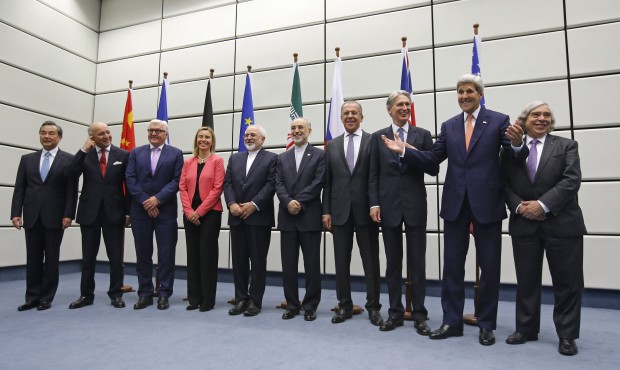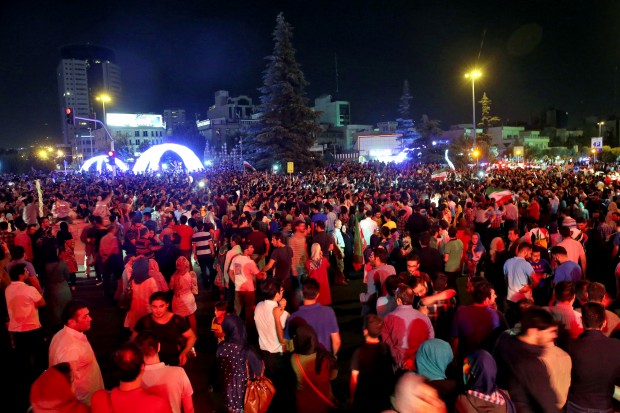US, Iran reach new deal, curbing Iran’s nuclear bomb ambition

From left to right, Chinese Foreign Minister Wang Yi, French Foreign Minister Laurent Fabius, German Foreign Minister Frank Walter Steinmeier, European Union High Representative for Foreign Affairs and Security Policy Federica Mogherini, Iranian Foreign Minister Mohammad Javad Zarif, Head of the Iranian Atomic Energy Organization Ali Akbar Salehi, Russian Foreign Minister Sergey Lavrov, British Foreign Secretary Philip Hammon, U.S. Secretary of State John Kerry and U.S. Secretary of Energy Ernest Moniz pose for a group picture at the United Nations building in Vienna, Austria, Tuesday, July 14, 2015. After 18 days of intense and often fractious negotiation, world powers and Iran struck a landmark deal Tuesday to curb Iran’s nuclear program in exchange for billions of dollars in relief from international sanctions ó an agreement designed to avert the threat of a nuclear-armed Iran and another U.S. military intervention in the Muslim world. (AP)
Iran and six major world powers agreed to a nuclear deal on Tuesday, concluding more than a decade of negotiations that could transform the Middle East.
U.S. President Barack Obama hailed a step towards a “more hopeful world” and Iran’s President Hassan Rouhani said it proved that “constructive engagement works”. But Israel pledged to do what it could to stop what it called an “historic surrender”.
The agreement will now be debated in the U.S. Congress, but Obama said he would veto any measure to block it.
“This deal offers an opportunity to move in a new direction,” Obama said. “We should seize it.”
Under the deal, sanctions imposed on Iran by the United States, European Union and United Nations will be lifted in return for agreeing long-term curbs on a nuclear program that the West has suspected was aimed at creating a nuclear bomb.
Iran will suspend the majority of its centrifuges used to enrich uranium and sharply reduce its low-enriched uranium stockpile, for at least a decade.
The agreement is a political triumph for both Obama, who has long promised to reach out to historic enemies, and Rouhani, a realist elected two years ago on a vow to reduce the isolation of his nation of 80 million people.
Both face distrust from powerful hardliners at home in nations that referred to each other as “the Great Satan” and a member of the “Axis of Evil”.
“Today is the end to acts of tyranny against our nation and the start of cooperation with the world,” Rouhani said in a televised address. “This is a reciprocal deal. If they stick to it, we will. The Iranian nation has always observed its promises and treaties.”
Delighted Iranians celebrated in the streets of Tehran, dancing, honking car horns and flashing victory signs after the announcement of a deal they hope will end years of sanctions and isolation.

Iranians gather for celebrations following a landmark nuclear deal in Tehran, Iran, Tuesday, July 14, 2015. Overcoming decades of hostility, Iran, the United States, and five other world powers struck a historic accord Tuesday to check Tehran’s nuclear efforts short of building a bomb. The agreement could give Iran access to billions in frozen assets and oil revenue, stave off more U.S. military action in the Middle East and reshape the tumultuous region. (AP Photo/Ebrahim Noroozi)
For Obama, the diplomatic relations with Iran ranks alongside his normalization of ties with Cuba as landmarks in a legacy of resolution with foes that affected his predecessors for decades.
“History shows that America must lead not just with our might but with our principles,” he said in a televised address. “Today’s announcement marks one more chapter in our pursuit of a safer, more helpful and more hopeful world.”
Animosity between Iran and the United States has loomed over the Middle East for decades. Iran is the predominant Shi’ite Muslim power, hostile both to Israel and to Washington’s Sunni Muslim-ruled Arab friends, particularly Saudi Arabia. But a common ground is how Washington has been aiding to fight Islamic State from the air while Iran aids Iraqi militias fighting it on the ground. Moreover, Iran’s coming out of isolation would result in more people traveling again, which means more opportunities for Western companies to invest and trade with Iran.
Still, Washington’s allies in the region were furious with the deal with Iran, as it may jeopardize their agendas. Israeli Prime Minister, Benjamin Netanyahu went on to call it an ‘historic mistake’.
While Saudi Arabia did not denounce the deal publicly as Israel did, its officials expressed doubt in private.
“We have learned as Iran’s neighbors in the last 40 years that goodwill only led us to harvest sour grapes,” a Saudi official who asked to remain anonymous told Reuters.
Even in Iran, some hardliners criticized the deal. “Celebrating too early can send a bad signal to the enemy,” conservative lawmaker Alireza Zakani said in parliament, according to Fars News agency. Iran’s National Security Council would review the accord, “and if they think it is against our national interests, we will not have a deal”.
It will probably take months before Iran receives the benefits from the lifting of sanctions, according to the deal, because of the verification of the deal’s fulfillment. Once it is confirmed, Tehran will immediately gain access to around $100 billion in frozen assets, and can step up oil exports that have been reduced by almost two-thirds.
























































